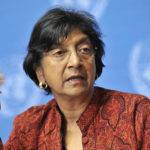
The Crisis of Human Rights: Discrimination Against Non-Citizens
The basic idea at the heart of human rights is that all human beings are equal: equal in rights – equal in human dignity. This idea is universally accepted and believed. At the same time another idea – the idea that we are separately citizens of different countries is also a feature of the modern world – and the way it is practised has led to enormous discrimination and violation of human rights. In reality people, as a matter of law, have different fundamental rights even though we believe that all human beings are equal.
In a recent paper titled “Human Rights in the Age of Migration: An Empirical Analysis of Human Rights of Non-citizens“ Tom Wong, of the University of California, highlights what has been called the crisis of human rights in which citizens have rights but non-citizens do not.
What is new in Wong’s article is its empirical study of this human rights gap. He tests a number of hypotheses. Two are of particular interest:
H1: The ratification patterns and trends of human rights treaties that extend human rights protections to noncitizens will mirror those of the other treaties that comprise the UN’s ore international human rights framework.
H2: As the increasing presence of noncitizens within the polity provides the impetus for the shift towards postnational citizenship, the likelihood of ratification is positively related to immigration.

The Migrant Workers Convention (“the International Convention on the Protection of the Rights of All Migrant Workers and Members of their Families“) is a human rights treaty specifically designed to protect the rights of non-citizens working in another country. It sets minimum standards for treatment of migrant workers (echoing basic international human rights treaties). Studying ratification of this and other treaties, Wong concludes that both hypotheses above are wrong. In fact ratification of the Migrant Worker’s Convention is largely confined to the developing world.
On hypothesis 2, Wong finds that countries which receive large numbers of immigrants are significantly less likely to extend basic human rights to migrants.
“Countries that receive immigrants are significantly less likely to extend basic human rights protections to irregular migrants and other noncitizens through ratification of the Migrant Workers Convention.”
What studies like Wong’s highlight- is the systematic use of law to violate human rights of non-citizens – in this case non-ratification of the Migrant Worker’s Convention. So what are some of the rights in that Convention.
- Migrant workers shall enjoy human rights and not be subject to discrimination.
- Migrant workers and their families enjoy the right to life.
- Migrants workers and their families shall not be subject to torture.
- Migrant workers shall not be held in slavery or servitude.
- Migrant workers and their families have the right to freedom of opinion and religion.
- Migrant workers and their families have the right to liberty and security of person and shall not be subject to arbitrary detention.
- Migrant workers and their families have a right to equality before the law.
Only 42 countries have ratified the Convention. Not a single western democracy has done so. Irrespective of whether someone is a “citizen” or not, such rights such should not be controversial. They are.







